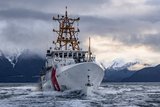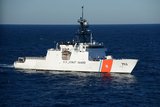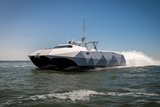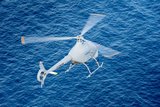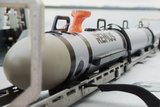Egypt orders DCNS FREMM frigate
Egypt and DCNS have signed an agreement for the supply of a FREMM multi-mission frigate, the company announced on 16 February.
The frigate, the current Normandie, will be delivered mid-2015 after some outfitting work, and the first phase of the training programme. The logistics and support services provided to the Egyptian Navy will continue over several years.
The frigate to be delivered under this agreement will be from a series currently under construction for the French Navy. To maintain the operational capacities of the French Navy, DCNS will increase the rate of production of its subsequent ships.
Hervé Guillou, chairman and CEO, DCNS, said: 'With this agreement, DCNS is pursuing a policy of long-term partnership with the Egyptian Navy and its shipyards, with whom we plan to invest in the long-term to develop their skills and industrial facilities. In addition, strengthening our relations opens new perspectives for the sale of vessels.'
FREMM multi-mission frigates are versatile vessels that can respond to all types of air, marine, submarine or land threats. They have a length of 142m, width of 20m, displacement of 6,000 tonnes and a maximum speed of 27 knots.
More from Naval Warfare
-
![How far will the US Navy’s FF(X) design deviate from the Legend-class?]()
How far will the US Navy’s FF(X) design deviate from the Legend-class?
The new frigate class’s focus on modularity, speed to build and enhanced armament align with the priorities of the US Navy’s Golden Fleet.
-
![How China’s naval advancements are pushing the US Navy to innovate]()
How China’s naval advancements are pushing the US Navy to innovate
The US Navy is set to invest $30 billion in artificial intelligence, cyber, space and autonomy research and development efforts in FY2026 as the force rethinks how it fights in light of China’s naval rise.
-
![UK and France signal shift to autonomous helicopters to boost naval power]()
UK and France signal shift to autonomous helicopters to boost naval power
Recent developments in France and the UK highlight how autonomous helicopters are becoming central to naval force design as navies seek to integrate crewed and uncrewed systems at sea.
-
![What HII’s UK expansion could mean for Royal Navy’s uncrewed future]()
What HII’s UK expansion could mean for Royal Navy’s uncrewed future
As HII prepares to deliver its latest AI-enabled uncrewed surface vessel later this year, its major UK facility expansion aligns with the UK Royal Navy’s plans for a hybrid fleet.









